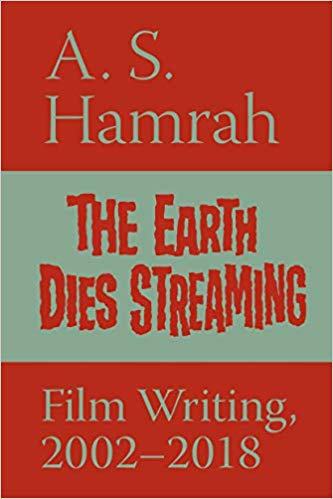Book Review: “The Earth Dies Streaming” — Insistent Originality
By Gerald Peary
I happily read The Earth Dies Streaming through, all 433 pages of acute, often brilliant writing. And also often funny as hell.
The Earth Dies Streaming by A.S. Hamrah. n+1 Books, 452 pages, $20.

It was probably a good thing for my sanity that The Real Paper, Boston’s alternative weekly, shut down in 1981. As the first-string film critic for its final 2 ½ years, I was ready to vomit for having to review the “big” films each week, the mainstream Hollywood movies with name stars and the easy-to-digest narratives. I only returned to being a reviewer when I could cherry-pick what I wished to discuss. I had a lovely run at The Boston Phoenix, where I chimed in about foreign-language movies, indie features, and documentaries. And now at The Arts Fuse, I write only what I want to write, and at the length I want. No editor sits on my chest making me opine about studio action flicks or Tyler Perry movies or, god forbid, wax on about what worthy picture should take the Oscars.
That’s a long way to say why A.S. Hamrah, an unusual-minded film critic, requires a place to write that embraces his insistent originality. He’s found it at n+1 magazine, where he’s the long-time monthly reviewer. A wonderful anthology of Hamrah’s essays was published recently, The Earth Dies Streaming: Film Writing 2002-2018, and I happily read it through, all 433 pages of acute, often brilliant writing. And also often funny as hell.
On The King’s Speech: “…as an American who recoils from monarchy, I am compelled to ask, what if we solved the king’s problem by cutting off his head?”
On The Town: “How many helicopter shots of Charlestown, Massachusetts, can one film hold? Was The Town directed by Google Maps?”
About twenty years ago, Hamrah resided in the Boston area, and I can’t fathom how we let him get away. He lived in Allston, he was employed as a projectionist, but, according to his testimony in this book, the local media showed little interest in having him write for them. His best day was when he was asked by the French Library to moderate a discussion with the Belgian avant-garde feminist filmmaker, Chantal Akerman. After the Q&A, he took her for dinner at a cheapo Vietnamese restaurant on Brighton Avenue that he populated twice a day.
Hamrah: “While we spoke I could not look directly into her very pale blue eyes. She treated me like someone she would talk to anyway. Chantal Akerman was eating with me in the only restaurant I could stand.”
Hamrah found himself by relocating from Beantown to New York, taking a paying day job, and securing his fine critic gig. n+1 doesn’t demand that he write about more popular films, and allows him space, as in August 2018, to do his whole column about his beloved Akerman: “The best movie in New York is playing on five screens in one room: Chantal Akerman’s NOW, an installation that is the director of Jeanne Dielman’s last completed work, is the sole occupant of a black-walled gallery on a high floor at the Jewish Museum.”
Hamrah is, unapologetically, a highbrow film critic. Many of his favorite filmmakers such as Akerman produce work which the general public would hardly consider, and certainly barely understand. Abbas Kiarostami, Kelly Reichardt, Hou Hsiao Hsien, etc. His best-loved famous directors of recent years, Godard and Kubrick, are among the most elitist. Not surprisingly, Steven Spielberg is not in Hamrah’s pantheon. On the much-overpraised Lincoln, this lethal stab: “the culmination of the Spielberg-Lucas reimagining of American cinema as family entertainment.”
Animated films? As someone who has avoided forever The Lion King and Pocahontas and loathes anime and Claymation, I was buoyed by Hamrah’s noble vow:
“I’ve decided to live my life cartoon-free! I spent too much time…listening to otherwise normal adults describe the plots of animated movies. As someone with no children and no nieces or nephews, as a free man who does not have to take kids to matinees, I hereby declare my independence from cartoons.”

A. S. Hamrah — he lives his life cartoon-free. Photo: n + 1 Benefit.
Hamrah certainly has been bitten by the “auteur theory” of critic Andrew Sarris, reading films from the vantage of the directors. But his strongest influence, he attests, is the veteran Chicago-based critic, Jonathan Rosenbaum, who has made a lifetime railing against those regarding movies as escapist entertainment; and he has championed the most challenging filmmakers from around the globe, especially politically-minded ones. But Hamrah’s other critic deity is Negative Space’s Manny Farber, for his jazzy, idiosyncratic style and, more, for concocting the most informal reviews, entering movies wherever he wants and only writing about the part of a movie which interests him. And then jumping away, like a jazz musician finished with his solo.
That’s Hamrah too, who consciously dodges the tedious parts of regular film reviewing—setting up the filmmaker, contextualizing the genre, giving away a bit of the plot—and gets right to the juicy parts, what fascinates him. The psychoanalyst, Jacques Lacan, famously had five-minute therapy sessions. Hamrah likewise cuts to the chase.
On the woeful, misguided The Curious Case of Benjamin Button:
“In a series of bad dreams, Brad Pitt combines with Forrest Gump, E.T., Oliver from The Brady Bunch, the baby from Eraserhead, Tom Waits album covers, Dr. Zhivago, Dick Cheney/Donald Rumsfeld, on an on, like locusts eating the insides of a movie theater for three hours.”
The whole on-target Hamrah review is cited above. That’s all folks! Who needs more?
Gerald Peary is a Professor Emeritus at Suffolk University, Boston, curator of the Boston University Cinematheque, and the general editor of the “Conversations with Filmmakers” series from the University Press of Mississippi. A critic for the late Boston Phoenix, he is the author of nine books on cinema, writer-director of the documentaries For the Love of Movies: the Story of American Film Criticism and Archie’s Betty, and a featured actor in the 2013 independent narrative Computer Chess. He is currently at work co-directing with Amy Geller a feature documentary, The Rabbi Goes West.

Nice piece about an excellent book. Scott actually wrote several pieces for the Phoenix before and after he was in Boston, some of which are included.
…that should be *while* he was in Boston and after…